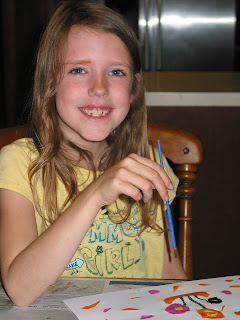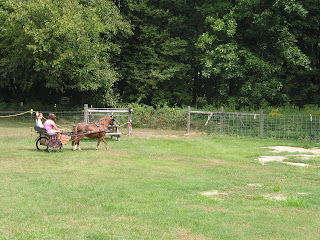
9/22/2011
DCS - Friend or Foe?
When deciding to become foster parents and work directly with the State, you open yourself up to the scrutiny and inspection of DCS (Department of Child Services, as it's called in Indiana; also known as CPS - Child Protective Services). Social workers will be in your home. They will watch you interact with your biological family and your foster children. They will walk through your home to ensure it is a safe environment for children. They will look through your home study (approximately 30 pages of information you provide to them about your life, your values, your discipline techniques, your finances, your childhood, your everything). Your life becomes an open book, by necessity, for them to give you their stamp of approval as a foster parent. DCS is like a friend that you share everything with.
As a homeschooling family, we hear plenty of horror stories from others like us who face questioning or detention by DCS. Homeschooling has come a long way since the "movement" began 30 years ago. Parents' rights to homeschool their children are protected freedoms in America. Yet there are situations that make the news now and then about a judge ruling that certain parents cannot homeschool their children or that children are suffering "educational neglect" and are therefore removed from their home. Homeschoolers are generally taught to fear DCS, to stay clear of them as much as possible, and to know their individual rights should DCS ever knock on their door with questions about why their kids aren't in school. DCS is viewed as a foe, an enemy to avoid at all cost.
Walking the fine line between these two is indeed like walking a tightrope. We have done that for the last year. For most of that year, we felt trusted by the DCS workers we interacted with. No questions were raised about our homeschooling - nobody asked how often we "do school" or what curriculum we use or even how we expected foster parenting to impact our homeschooling. They left us alone.
In more recent interaction with DCS social workers, however, the tide seemed to turn. We got a taste of what it must be like for parents to have DCS interfere with daily life, to question their motives, to take things out of context, to make judgements based on insufficient information. It felt like we were betrayed by a friend - our "friend" DCS, whom we had shared our everything with. Suddenly we were suspect, we were viewed by them as an enemy. I cannot go into more detail due to confidentiality and privacy concerns.
For us, DCS was both a friend and a foe. For most of our year as foster parents, we were on the same team, working together and getting along well. But near the end, we were very disappointed by the relationship, the lack of support, the presence of suspicion, condemnation and judgment. That experience painted DCS as more of a foe in my mind.
Here are a few things I've tried to remember throughout this time:
1) Our experience is only our experience. Others may have great experiences or terrible experiences working with DCS as foster parents. I cannot paint DCS as all good or all bad, because DCS is made up of hundreds (in our county) of employees. Some of those are good at what they do and some aren't. As in any group of people, there are both. Yet each of those employees represents DCS and makes an impression on the public they interact with, who will form impressions of DCS based on that person's representation.
2) Many people have difficulties working directly with DCS. As a state-run agency, everyone employed there is over-worked and under-paid. Social workers have huge case loads, demanding more from them than can reasonably be accomplished in any given work day. This is a reason why many foster parents choose to work through a private agency, instead of working directly with DCS. They can give more support to their foster parents. They aren't spread as thin. They provide help more promptly. There are pros and cons to both working directly with DCS or working with a private agency. We may not have experienced the difficulties we did if we had been working with a private agency instead of with DCS directly.
3) Our experience in recent weeks has given us a great opportunity to put this biblical principle into practice - Romans 12:14 Bless those who persecute you; bless and do not curse. My kids and I had been memorizing that passage during some of those difficult times with DCS. It came back to me over and over. Bless. Don't curse. Don't grow bitter. Bless the work they are doing on behalf of children in need.
I don't share our experience to discourage anyone from becoming a foster parent. I do share it so that anyone who heads that direction has eyes wide open to the good and the bad they may encounter, in order to be prepared more fully.
Foster care is a broken system run by broken people who are trying to help other broken people. Nothing about it is perfect. The very reason that children end up in foster care is become something went wrong. There is no perfect solution for them, since God's "perfect solution" (ie. a loving, caring family) fell through. So the people involved try the best they can to provide a "good" situation, but they cannot provide a perfect situation. At this point in America's history, foster care is the government's way to respond to the orphan crisis. Choosing to enter into that system as foster parents is to open yourself up to the good and the bad that comes with it. Our experience proved DCS as a friend and a foe, in a 12-month time period.

















































